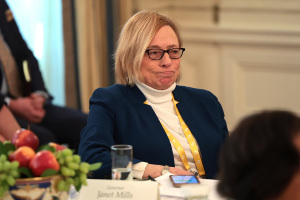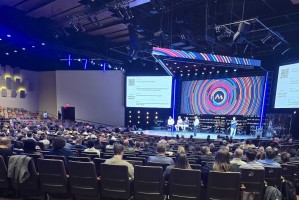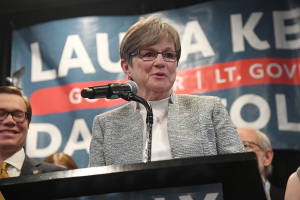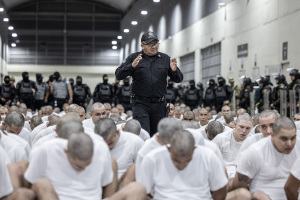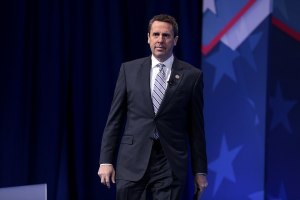President Obama State of the Union Address 2016 Full Transcript Text
It's up to us to help remake that system. And that means we have to set priorities.
Priority number one is protecting the American people and going after terrorist networks. Both al Qaeda and now ISIL pose a direct threat to our people, because in today's world, even a handful of terrorists who place no value on human life, including their own, can do a lot of damage. They use the Internet to poison the minds of individuals inside our country; they undermine our allies.
But as we focus on destroying ISIL, over-the-top claims that this is World War III just play into their hands. Masses of fighters on the back of pickup trucks and twisted souls plotting in apartments or garages pose an enormous danger to civilians and must be stopped. But they do not threaten our national existence. That's the story ISIL wants to tell; that's the kind of propaganda they use to recruit. We don't need to build them up to show that we're serious, nor do we need to push away vital allies in this fight by echoing the lie that ISIL is representative of one of the world's largest religions. We just need to call them what they are – killers and fanatics who have to be rooted out, hunted down, and destroyed.
That's exactly what we are doing. For more than a year, America has led a coalition of more than 60 countries to cut off ISIL's financing, disrupt their plots, stop the flow of terrorist fighters, and stamp out their vicious ideology. With nearly 10,000 air strikes, we are taking out their leadership, their oil, their training camps, and their weapons. We are training, arming, and supporting forces who are steadily reclaiming territory in Iraq and Syria.
If this Congress is serious about winning this war, and wants to send a message to our troops and the world, you should finally authorize the use of military force against ISIL. Take a vote. But the American people should know that with or without Congressional action, ISIL will learn the same lessons as terrorists before them. If you doubt America's commitment – or mine – to see that justice is done, ask Osama bin Laden. Ask the leader of al Qaeda in Yemen, who was taken out last year, or the perpetrator of the Benghazi attacks, who sits in a prison cell. When you come after Americans, we go after you. It may take time, but we have long memories, and our reach has no limit.
Our foreign policy must be focused on the threat from ISIL and al Qaeda, but it can't stop there. For even without ISIL, instability will continue for decades in many parts of the world – in the Middle East, in Afghanistan and Pakistan, in parts of Central America, Africa and Asia. Some of these places may become safe havens for new terrorist networks; others will fall victim to ethnic conflict, or famine, feeding the next wave of refugees. The world will look to us to help solve these problems, and our answer needs to be more than tough talk or calls to carpet bomb civilians. That may work as a TV sound bite, but it doesn't pass muster on the world stage.
We also can't try to take over and rebuild every country that falls into crisis. That's not leadership; that's a recipe for quagmire, spilling American blood and treasure that ultimately weakens us. It's the lesson of Vietnam, of Iraq – and we should have learned it by now.
Fortunately, there's a smarter approach, a patient and disciplined strategy that uses every element of our national power. It says America will always act, alone if necessary, to protect our people and our allies; but on issues of global concern, we will mobilize the world to work with us, and make sure other countries pull their own weight.
That's our approach to conflicts like Syria, where we're partnering with local forces and leading international efforts to help that broken society pursue a lasting peace.
That's why we built a global coalition, with sanctions and principled diplomacy, to prevent a nuclear-armed Iran. As we speak, Iran has rolled back its nuclear program, shipped out its uranium stockpile, and the world has avoided another war.
That's how we stopped the spread of Ebola in West Africa. Our military, our doctors, and our development workers set up the platform that allowed other countries to join us in stamping out that epidemic.
That's how we forged a Trans-Pacific Partnership to open markets, protect workers and the environment, and advance American leadership in Asia. It cuts 18,000 taxes on products Made in America, and supports more good jobs. With TPP, China doesn't set the rules in that region, we do. You want to show our strength in this century? Approve this agreement. Give us the tools to enforce it.
Fifty years of isolating Cuba had failed to promote democracy, setting us back in Latin America. That's why we restored diplomatic relations, opened the door to travel and commerce, and positioned ourselves to improve the lives of the Cuban people. You want to consolidate our leadership and credibility in the hemisphere? Recognize that the Cold War is over. Lift the embargo.
American leadership in the 21st century is not a choice between ignoring the rest of the world – except when we kill terrorists; or occupying and rebuilding whatever society is unraveling. Leadership means a wise application of military power, and rallying the world behind causes that are right. It means seeing our foreign assistance as part of our national security, not charity. When we lead nearly 200 nations to the most ambitious agreement in history to fight climate change – that helps vulnerable countries, but it also protects our children. When we help Ukraine defend its democracy, or Colombia resolve a decades-long war, that strengthens the international order we depend upon. When we help African countries feed their people and care for the sick, that prevents the next pandemic from reaching our shores. Right now, we are on track to end the scourge of HIV/AIDS, and we have the capacity to accomplish the same thing with malaria – something I'll be pushing this Congress to fund this year.
That's strength. That's leadership. And that kind of leadership depends on the power of our example. That is why I will keep working to shut down the prison at Guantanamo: it's expensive, it's unnecessary, and it only serves as a recruitment brochure for our enemies.
That's why we need to reject any politics that targets people because of race or religion. This isn't a matter of political correctness. It's a matter of understanding what makes us strong. The world respects us not just for our arsenal; it respects us for our diversity and our openness and the way we respect every faith. His Holiness, Pope Francis, told this body from the very spot I stand tonight that "to imitate the hatred and violence of tyrants and murderers is the best way to take their place." When politicians insult Muslims, when a mosque is vandalized, or a kid bullied, that doesn't make us safer. That's not telling it like it is. It's just wrong. It diminishes us in the eyes of the world. It makes it harder to achieve our goals. And it betrays who we are as a country.
"We the People." Our Constitution begins with those three simple words, words we've come to recognize mean all the people, not just some; words that insist we rise and fall together. That brings me to the fourth, and maybe the most important thing I want to say tonight.
The future we want – opportunity and security for our families; a rising standard of living and a sustainable, peaceful planet for our kids – all that is within our reach. But it will only happen if we work together. It will only happen if we can have rational, constructive debates.
It will only happen if we fix our politics.
A better politics doesn't mean we have to agree on everything. This is a big country, with different regions and attitudes and interests. That's one of our strengths, too. Our Founders distributed power between states and branches of government, and expected us to argue, just as they did, over the size and shape of government, over commerce and foreign relations, over the meaning of liberty and the imperatives of security.
But democracy does require basic bonds of trust between its citizens. It doesn't work if we think the people who disagree with us are all motivated by malice, or that our political opponents are unpatriotic. Democracy grinds to a halt without a willingness to compromise; or when even basic facts are contested, and we listen only to those who agree with us. Our public life withers when only the most extreme voices get attention. Most of all, democracy breaks down when the average person feels their voice doesn't matter; that the system is rigged in favor of the rich or the powerful or some narrow interest.

















